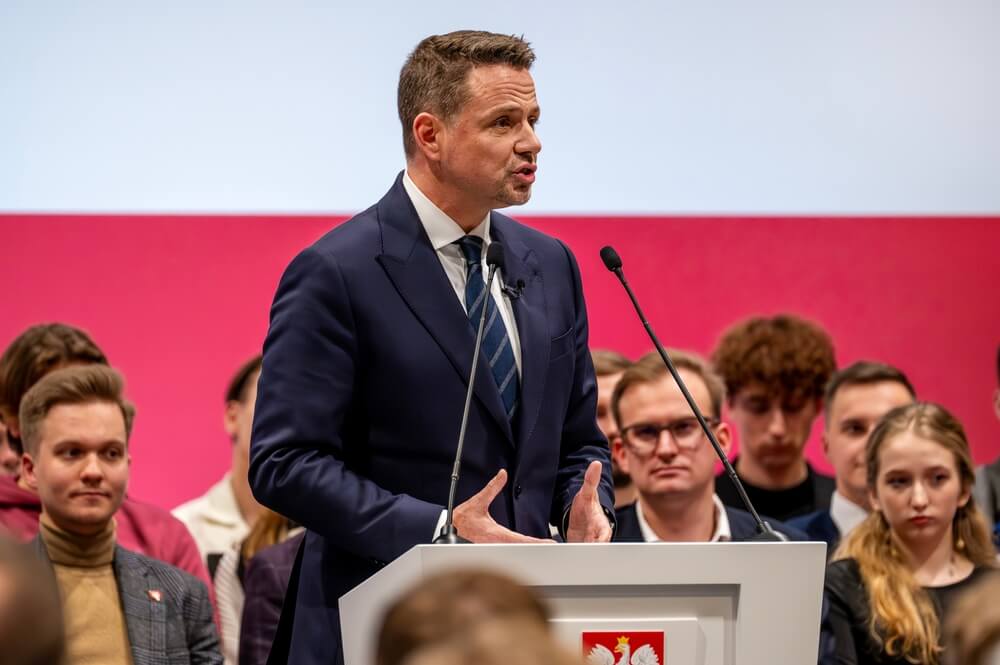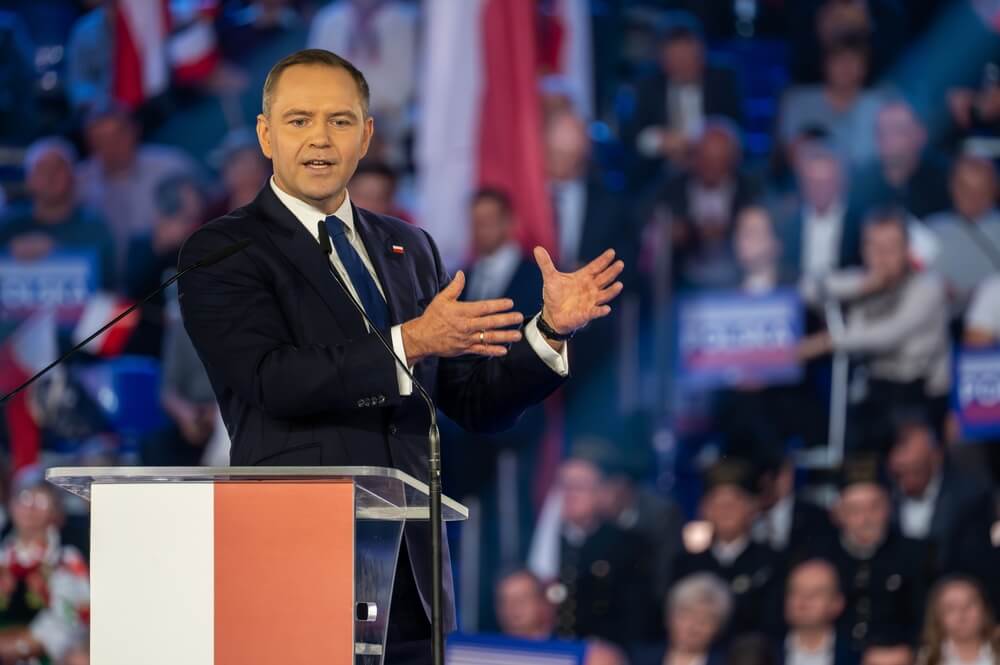The Polish presidential elections scheduled for 18 May represent a significant moment in the development of the country and its position within the European Union.
For the first time since the adoption of constitutional amendments two decades ago, voters will elect a new head of state without the current president on the list of candidates.
Andrzej Duda held two consecutive mandates and is constitutionally barred from running again, so the election scene has been dominated by an open battle between two opposing visions: one involves deeper integration with Brussels and strengthening the rule of law, while the other aims to reaffirm national sovereignty and the continuity of conservative policies.
The main candidate, Rafał Trzaskowski, the mayor of Warsaw, has positioned himself as the candidate of the civic centre.
He promises to restore the independence of the courts and revise the judicial reforms that have led to serious objections from the European Commission over the last five years.
His message is that the balance between executive, legislative and judiciary must be restored.
The campaign also focuses on extending social programmes, including by providing additional funding for public health and women's rights.
Trzaskowski has recognised that dissatisfaction with the rising cost of living and concern for democracy among urban and younger voters are important grounds for support.
At rallies in Warsaw, Kraków and Wrocław, his supporters often refer to the European Union as a guarantor of progress and stability and symbolise this by waving blue flags with stars.
“Foreign influences”
In contrast to him, Karol Nawrocki, the candidate of the Law and Justice Party (PiS), creates a narrative about the preservation of traditional values and the strengthening of national independence.
He was a curator in museums dedicated to the memory of the communist regime. He is therefore building his campaign on opposition to what he calls "foreign influences" that threaten Polish culture and family values.
His economic offer includes generous tax breaks for families and subsidies for agriculture but also a tough stance on immigration.
Nawrocki has criticised Brussels for "excessive interference" in the internal affairs of member states
Nawrocki has repeatedly criticised Brussels for "excessive interference" in the internal affairs of member states and stressed that Poland must retain control over its own judges and policies.
Behind these two candidates is a group of smaller, independent candidates who promise to expose corruption and abolish the influence of political parties on state institutions.
Although it is unlikely that any of them will make it to the second round, their calls for more transparency in public procurement and the professionalisation of the judiciary have forced Trzaskowski and Nawrocki to include these issues in their programmes.
Voter turnout becomes a decisive factor
As there is no candidate who would defend his throne from a position of power, voter turnout becomes a decisive factor.
Historically, voter turnout in parliamentary elections in Poland is below 50 per cent, while it can be as high as 70 per cent in the second round of presidential elections.
Current polls indicate that around two-thirds of voters could go to the polls on 18 May, but the real winner will depend on their ability to mobilise specific demographic groups.
The focus of the debate is on the rule of law
Trzaskowski had a positive effect on the electorate in large urban centres, while Nawrocki has an advantage in smaller towns and in the countryside, where PiS's social measures were most visible.
Naturally, the focus of the debate is on the rule of law. Trzaskowski has promised to reinstate the majority of Constitutional Tribunal judges PiS replaced and to restore the independence of the State Tribunal, while Nawrocki claims that any change without "respect for continuity" would be unconstitutional.
The EU is watching closely
It is clear that the European Union is watching closely to see whether the new president will implement the reforms demanded by Brussels to free up several billion euros from regional development policy funds.
If the concept of the rule of law is completely ignored, the freezing of funds and new financial sanctions could follow.
 Rafal Trzaskowski supports meeting the NATO target of two per cent of GDP for defence
Rafal Trzaskowski supports meeting the NATO target of two per cent of GDP for defence
The security aspect, although seemingly neutral in both campaigns, contains subtle nuances. Trzaskowski supports meeting the NATO target of two per cent of GDP for defence and proposes an accelerated timetable for investing in modernising armed forces.
Nawrocki, on the other hand, insists on a more direct partnership with the United States and emphasises the need for the further deployment of American troops on Polish territory.
Both approaches have a common position of firm support for Ukraine, but the difference in the way of implementation could be a signal for future agreements and strategy.
The economic perspective offers a third dimension. Trzaskowski is looking to the future through the green transition: he is planning major investments in renewable energy sources, promoting the construction of wind farms on the Baltic Sea, and digitising public services.
For his team, infrastructure projects are the key to creating new jobs in the regions affected by depopulation.
On the other hand, Nawrocki prefers to maintain incentives in agriculture and energy protection for households by controlling gas and electricity prices, which earned him the support of the lower-income groups but led to tensions with energy regulators.
General solidarity within the Union
It is unlikely that the election on 18 May will produce a winner with an absolute majority, so a second round on 1 June seems certain.
Current projections put Trzaskowski at around 40 per cent of the vote and Nawrocki at around 36 per cent, with the remaining votes still dependent on undecided voters.
 Current projections put Trzaskowski at around 40 per cent of the vote and Nawrocki at around 36 per cent - Karol Nawrocki
Current projections put Trzaskowski at around 40 per cent of the vote and Nawrocki at around 36 per cent - Karol Nawrocki
In the transition period, the candidates must broaden their appeals: Trzaskowski to win over moderate conservatives concerned about social issues and Nawrocki to appeal to the urban population and youth who may harbour opposition to PiS.
The broader European scene places this election in the context of general solidarity within the Union.
The future Polish leader will have to weigh national interests against the collective goals of the EU, particularly in the area of migration and the energy transition.
The experience with the boycott of Russian gas and the realisation of the Baltic-Poland gas pipeline is a test for Poland on how to reduce its energy dependence on Russia while maintaining continuous aid to Ukraine.
The media atmosphere makes the situation even more complicated. The PiS-controlled state services selectively report and highlight Nawrocki's criticism of "hostile elites".
Independent portals and TV channels respond with a strong campaign about the alarming state of democracy and support Trzaskowski.
Cybersecurity experts point to the increase in disinformation from various sources that could influence voter perceptions at a crucial time when trust is declining.
European funds could remain frozen
The key complication lies in the potential delay with Brussels. In the event that the new president does not remove the obstacles in the judicial system, European funds for infrastructure and green investments could remain frozen.
This would mean the loss of billions of euros earmarked for Poland on the basis of the EU's new financial framework. At the same time, adapting to European ambitions in terms of climate goals and digitisation without financial support may make it difficult to modernise key sectors.
However, there is a chance for a new beginning. The European institutions' belief that collaborating with the new administration could free up funds could motivate the centre-right candidate to offer additional compromises.
The Polish electorate is divided, but it shows a willingness to resist extremism and excessive polarisation
This in turn would show that the union has the tools to resume dialogue with the deadlocked member. If, on the other hand, the new president rejects all of Brussels' conditions, this could encourage other countries to pay less attention to the common rules, which would shake the entire European structure.
The election campaign has entered its final phase, and every word and every statement are being carefully weighed up. The Polish electorate is divided, but it shows a willingness to resist extremism and excessive polarisation.
The outcome of the election will raise the question: will the country strive for European cohesion or rely on its own national foundations? Either way, the forthcoming decision by the Polish electorate will send a signal to the rest of Europe, which is facing its own challenges in terms of democracy, security and economic recovery.